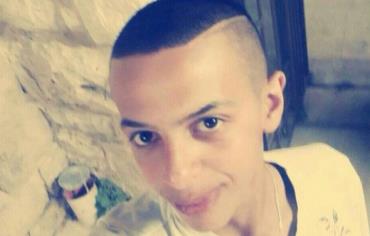Yonah Jeremy Bob; Lahav Harkov
Supreme Court Lifts Gag Order on Lead Alleged Murderer of Abu Khdeir
Name made public of Yosef Chaim Ben-David, after court rejects plea to not publicize identity.
The Jerusalem Post
2014-07-20
Source

Abu Khdeir (Photo: Reuters)
Yosef Chaim Ben-David, 29, from the Adam settlement, was named as the supposed principal murderer of Muhammad Abu Khdeir, the 16-year-old Palestinian from the east Jerusalem neighborhood of Shuafat.
His name was made public on Sunday night after a final appeal by Ben-David to the Supreme Court failed, when Justice Elyakim Rubinstein rejected his argument that publicizing his name would lead to his family coming under threat.
Ben-David, along with two other Jewish minors, was indicted in the Jerusalem District Court by the Jerusalem district-attorney, for the alleged nationalist revenge murder.
Following the indictment, the Defense Ministry recognized Abu Khdeir as a victim of hate crime, granting his family identical compensation rights to victims of Arab terrorism, such as casualties of suicide bombings (assuming its decision is adopted by the National Insurance Institute).
The names of the minor defendants, a 16-year-old from Jerusalem and another from Beit Shemesh, are to remain under a gag order, but by last Thursday the Jerusalem District Court had ordered the gag order removed regarding Ben-David.
However, the District Court froze its own decision when Ben-David appealed, setting the stage for Sunday’s showdown at the Supreme Court.
The three suspects were charged with murder and kidnapping as well as a slew of other crimes.
Attorney-General Yehuda Weinstein called the murder a “horrifying act,” but praised law enforcement for the swiftness with which they arrested the three defendants.
Abu Khdeir was abducted and brutally murdered by being burned alive on July 2, while waiting to enter a mosque in east Jerusalem. He was targeted because he was an Arab.
Rubinstein accepted the state’s argument that neither the police nor Shin Bet (Israel Security Agency) found that Ben-David’s family was in any danger.
In addition, he accepted State Prosecutor Uri Korb’s argument that an alleged incident of the family being attacked with a fire bomb was fictional and that there was no evidence.
Rubinstein rejected the argument that revealing Ben-David’s identity could expose the two minors’ identities—essentially saying that some amount of suffering may be unavoidable for families and codefendants of murder defendants.
The indictment included charges against Ben-David and one of the minors for their attempt to kidnap 7½-year-old Musa Zaloom of Beit Hanina and striking him and his mother with whom he was walking while she pushed another of her children in a stroller.
The indictment has separate charges for multiple attempts by the same two to burn Arab cars in Sur Bahir.
According to the indictment, all three wore non-Haredi clothes to try to mask their identities during the attempts to kidnap Arabs.
Ben-David drove the car, while the minor got out to attack the 7½-year-old, the indictment said.
It alleged that in the case of Abu Khdeir, Ben-David again drove the car, while both minors attacked and threw Abu Khdeir into the vehicle.
The Arab youth tried to call his uncle, attempted to escape and even kicked one of the defendants in the face before they overpowered him.
The indictment said that Abu Khdeir was partially- strangled and struck on the head by the defendants multiple times as Ben-David called out the names of murdered Jews, such as Shalhevet Pass, the Fogel family, Gil-Ad Shaer, Eyal Yifrah and Naftali Fraenkel.
Ben-David told the minors to burn his body to erase the evidence and then they doused him with gasoline, burning him alive.
Responding to the Defense Ministry’s recognition of Abu Khdeir as a terrorism victim, Almagor Terror Victims Association director Lt.-Col. (ret.) Meir Indor said his organization would fight the decision, even if it means lobbying to have a law changed in the Knesset.
According to Indor, the law to pay benefits to victims of terrorism was only meant to support “those who were injured or the families of those killed by organizations that are enemies of the State of Israel.”
On July 14, Honenu, a rightwing group representing one of the suspects, said the oldest of the three suspects who had confessed to the murder of the Palestinian teenager may attempt to plead temporary insanity.
Both Ben-David and one of the minors take psychiatric drugs for obsessive compulsive disorder, said the indictment.
Ben-David had been working at a optometrist store in Jerusalem, while the two minors were either both studying in a yeshiva or about to return to their studies.
Following the earlier partial lifting of a gag order on the case, the Shin Bet released a report saying the three suspects had admitted to kidnapping Abu Khdeir, beating him and burning him alive.
The report said the three defendants had confessed that the homicide had been an act of revenge following the slaying of the three teenagers in June.
Police found the teenager’s badly burned remains at 5:20 a.m., approximately one hour after he was reported kidnapped.
Subsequent news coverage of the slaying led to Arab riots throughout east Jerusalem and the rest of the country.


